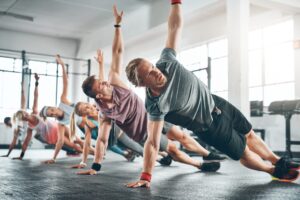
In the clinical setting, there are an abundance of systemic links between oral health and other health conditions, such as cardiovascular disease, diabetes, and dementia. However, an emerging area of concern is the correlation between oral health and physical performance, with reference to patients who regularly engage in exercise, sports, or physical labour. The frequency of encounters with dental patients who are exceedingly health-conscious is high.[i] Though these individuals are committed to health-holistic disciplines like clean eating, regular exercise, and fitness tracking, many of these patients still present with signs of gingival inflammation or plaque accumulation, particularly interdentally.
The correlation between sports players or athletes and poor oral health is alarming: one study found that in over 100 elite athletes, 43% needed an urgent referral to the dentist.[ii] While patients may not know to associate slower recovery times and decreased endurance with gum disease, studies are increasingly drawing a relationship between oral health and physical capability. The role that dental teams play in the health of athletes and active individuals is vital to maximise their performance.
The mouth-muscle connection
Exercise induces strain and stress on various body systems, which requires the body, in turn, to maintain a strong immune system and regulate inflammation. However, oral conditions, like periodontitis, can disrupt this stability and hamper multiple aspects of exercise. Persistent low-level inflammation can lead to increased levels of systemic inflammatory markers such as IL-6 and CRP.[iii] This is particularly detrimental to professional, high-frequency athletes – whose livelihoods often depend on recovery and performance – as well as amateur sportspeople that are committed to improving their craft.
Research published in the British Journal of Sports Medicine found that athletes with poor oral health reported negative impacts on training and performance significantly more than those without. In this study of athletes at the London 2012 Olympic Games, 18% reported that their oral health negatively affected their performance, with over 40% suffering from gingivitis and 28% from periodontitis.[iv] These consequences harm concentration, sleep quality, and training recovery, which of course compromise form and results.
Energy, recovery, and respiratory health
Oral health also has a significant effect on digestion, and moreover, nutrient absorption.[v] Both of these factors are integral for the fuelling of and recovery from physical activity. Furthermore, painful chewing due to caries, or other dental issues, inhibits the consumption of important healthy and energy-enhancing foods like vegetables, fibre, and other sources with important nutritional content. The resultant vitamin and mineral deficiencies can lead to inefficient muscle and bone repair after strenuous activity. In addition, when suffering from oral infections, the body’s immune system faces chronic imposition.[vi] Not only does this affect training abilities, but recovery extent, and susceptibility to injury.
For patients with an interest in endurance sports, respiratory health is integral and the oral cavity plays a crucial role. Periodontal pathogens such as Porphyromonas gingivalis and Fusobacterium nucleatum can be inhaled from the oral cavity into the lungs, worsening respiratory infections.[vii] This is particularly evident in patients who participate in high-intensity training, whose immune system can become compromised.
Additionally, a dry mouth, something most common in athletes that mouth-breathe during exercise like running or stamina-based sports, can be detrimental to oral health. The oral microbiome is compromised, increasing caries risk and soft tissue irritation.[viii] This overlooked, yet frequent condition can lead to infection, inflammation, further immune disruption, and will inevitably take a toll on performance and endurance.
Supporting physically active patients through preventative care
With the systematic studies and evidence surrounding oral health’s relationship with exercise, dental professionals are well-equipped to support their patients. By identifying inflammation early, and promoting primary interventions and strategic plans, athletes, fitness-devotees, and those alike can focus on what’s most important to them without the inhibitions of oral health. Interdental cleaning is a reliable way to prevent oral disease and maintain a healthy oral cavity, consistently.
 Recommending tools like the TANDEX FLEXI interdental brushes significantly decrease plaque build-up and continue to protect long term oral health. This subsequently protects physical health surrounding exercise. FLEXI brushes are available in 11 different sizes, offering patient-specific oral care. Combining this tool with the TANDEX PREVENT Gel enhances oral health further. The gel contains 0.12% chlorhexidine and 900 ppm fluoride, delivering anti-inflammatory and anti-caries benefits. Applying the gel directly to the ideal FLEXI brush allows for these benefits to work exactly where they’re needed most, ensuring oral health.
Recommending tools like the TANDEX FLEXI interdental brushes significantly decrease plaque build-up and continue to protect long term oral health. This subsequently protects physical health surrounding exercise. FLEXI brushes are available in 11 different sizes, offering patient-specific oral care. Combining this tool with the TANDEX PREVENT Gel enhances oral health further. The gel contains 0.12% chlorhexidine and 900 ppm fluoride, delivering anti-inflammatory and anti-caries benefits. Applying the gel directly to the ideal FLEXI brush allows for these benefits to work exactly where they’re needed most, ensuring oral health.
It is becoming abundantly clear that oral health demonstrates a causal effect on multiple aspects of human wellbeing. Sporting patients’ health goals, such as the ability to train, succeed competitively, recover, and perform consistently are often hugely affected by their oral health. Dental care providers must continue to educate patients on the detrimental consequences of poor hygiene and gingival inflammation to maximise their active lifestyles. Proposing oral hygiene as a performance enhancer empowers patients as athletes in optimising their fitness potential.

For more information on TANDEX’s range of products, visit https://tandex.dk/
Our products are also available from DHB Oral Healthcare https://dhb.co.uk/
 Author: Jacob Watwood
Author: Jacob Watwood
[i] Guo H, Tang H, Tang J, et al. How does the frequency of dental visits affect future dental health? Eur J Paediatr Dent. 2024;25(1):45-51.
[ii] Kragt, L., Moen, M. H., Van Den Hoogenband, C. R., & Wolvius, E. B. (2018). Oral health among Dutch elite athletes prior to Rio 2016. The Physician and Sportsmedicine, 47(2), 182–188. https://doi.org/10.1080/00913847.2018.1546105
[iii] Cecoro, G., Annunziata, M., Iuorio, M. T., Nastri, L., & Guida, L. (2020). Periodontitis, Low-Grade Inflammation and Systemic Health: A Scoping Review. Medicina, 56(6), 272. https://doi.org/10.3390/medicina56060272
[iv] Needleman, I., Ashley, P., Petrie, A., Fortune, F., Turner, W., Jones, J., Niggli, J., Engebretsen, L., Budgett, R., Donos, N., Clough, T., & Porter, S. (2013). Oral health and impact on performance of athletes participating in the London 2012 Olympic Games: a cross-sectional study. British journal of sports medicine, 47(16), 1054–1058. https://doi.org/10.1136/bjsports-2013-092891
[v] Mi, N., Zhang, M., Ying, Z. et al. Vitamin intake and periodontal disease: a meta-analysis of observational studies. BMC Oral Health 24, 117 (2024). https://doi.org/10.1186/s12903-024-03850-5
[vi] Wu, X., Shen, J., Zhang, X., Liu, B., Liu, M., Shi, J., Qian, S., Zong, G., Lai, H., Yuan, C., & Tonetti, M. S. (2024). The potential causal path between periodontitis stage diagnosis and vegetable consumption is mediated by loss of posterior functional tooth units and masticatory function. Journal of Clinical Periodontology, 51(6), 691–701. https://doi.org/10.1111/jcpe.13953
[vii] Imai, K., Iinuma, T., & Sato, S. (2021). Relationship between the oral cavity and respiratory diseases: Aspiration of oral bacteria possibly contributes to the progression of lower airway inflammation. The Japanese dental science review, 57, 224–230. https://doi.org/10.1016/j.jdsr.2021.10.003
[viii] Abou Rejaili, J., Moimaz, S. A. S., Saliba, T. A. S., Chiba, F. Y. M., & Saliba, O. (2021). Social habits, oral hygiene practices, and hydration in athletes. Lecturas: Educación Física y Deportes, 25(274), 48–63. https://www.efdeportes.com/efdeportes/index.php/EFDeportes/article/download/2457/1367
















